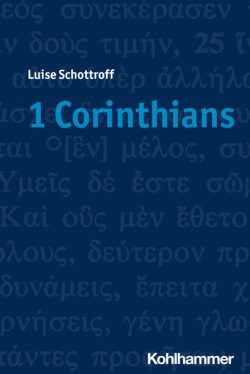Читать книгу 1 Corinthians - Luise Schottroff - Страница 7
На сайте Литреса книга снята с продажи.
1. Social History
ОглавлениеIn the introduction, Luise Schottroff writes in 2013 that she will portray Paul’s first letter to the congregation in Corinth from a socio-historical theological perspective. She assumes that the letter is addressed to specific people that Paul describes in this way: »not many wise, powerful or priviledged by birth,« rather »uneducated … weak, disadvantaged by birth, despised, things reduced to nothing« (cf. for on 1 Cor 1:26–28). This perspective determines how things will proceed: She thus bases her interpretation on a detailed investigation of the life-situation of the Corinthian congregation in the context of Roman-Hellenistic society in the first century, which was made up of people of diverse nations and languages, of enslaved and free, women and men. Based on her analysis, these people belonged principally to the lower classes. She does not understand the problems that are addressed in the letter as conflicts with »opponents,« but as discussions about how one lives, the backgrounds of which she develops in Basic Information Sections on themes like slavery, divorce, sacrificial meat—meat consumption, the theology of the body, eschatology. Thereby she comprehensively includes in her interpretation the open and subtle aspects of violence in the Roman Empire: crucifixions as a means of political deterrence, »games« as events for the masses in which people were tortured and executed, slavery as a structure that seizes power over people and their bodies. Paul sets in contrast to this the image of the congregation as the »body of the Messiah,« the concept of a collective body, with which God acts to effect liberation in the world (1 Cor 12:12–27) and which is not to be thought of in purely metaphorical terms. The congregation embodies the Risen One. The commentary’s manifold socio-historical data, which are based on history of religions and archeological investigations, serve to direct the gaze on the difficult life-situations of a congregation within the structures of the Roman-Hellenistic world, on the oppressive situation of women, children, the poor and enslaved and, at the same time, to open an understanding of the attractiveness of the message of the gospel. The people experience themselves in their community as a messianic body, which promises them dignity as God’s creatures and allows eschatological visions of God’s just world to develop.
In a programmatic essay in 1979, Luise Schottroff has already set forth the theological foundations for this socio-historical work: »Sin’s Reign of Terror and Liberation Through Christ According to Paul’s Letter to Rome«.1 Therein she shows that Paul’s statements on sin, on the meaning of the Torah and on Christ’s liberating activity are based on an analysis of the Roman Empire. The power of the texts then unfolds in a special way, when they are read in this way and questioned about their significance for people’s everyday life in the cities of the empire. Her analysis shows that Paul’s leading idea is that sin rules over all people as over slaves and Christ brings liberation from this dominion. The sphere of power of hamartia is the kosmos; it’s instrument of power is death. For the execution of its power, it employs the nomos. This word, according to Schottroff, does not mean the Torah but the compulsion that makes it impossible to do the will of God. Paul thinks about sin’s rule over the world within the dimensions of the Roman Empire, which are first viewed by the believers. They recognize that the ruler of the world makes use of the Torah. Luise Schottroff further asks what liberation from the power of sin means in concrete terms for people. Paul’s principal concern is not an improvement in general living conditions; he is thinking apocalyptically: His hope is directed to God’s final intervention, which has already begun with the resurrection of Christ. This hope in a final change of rule has had far-reaching political consequences. The people do not feel themselves loyal, in the first place, to the Roman Emperor as the Lord and his institutions, but to the God of Israel and to the Messiah God has sent.
With this interpretive framework, within which she also reads Paul’s other letters, Luise Schottroff prepared the way for further studies of socio-historical exegesis in the German context and internationally in the context of studies of empire-critical Pauline research, which is now being carried on under the watchword »Paul and Empire.« There are available a multitude of publications by her in the area of social-historical biblical interpretation.2 In 2009, together with Old and New Testament colleagues, she published the Sozialgeschichtliches Wörterbuch zur Bibel.
